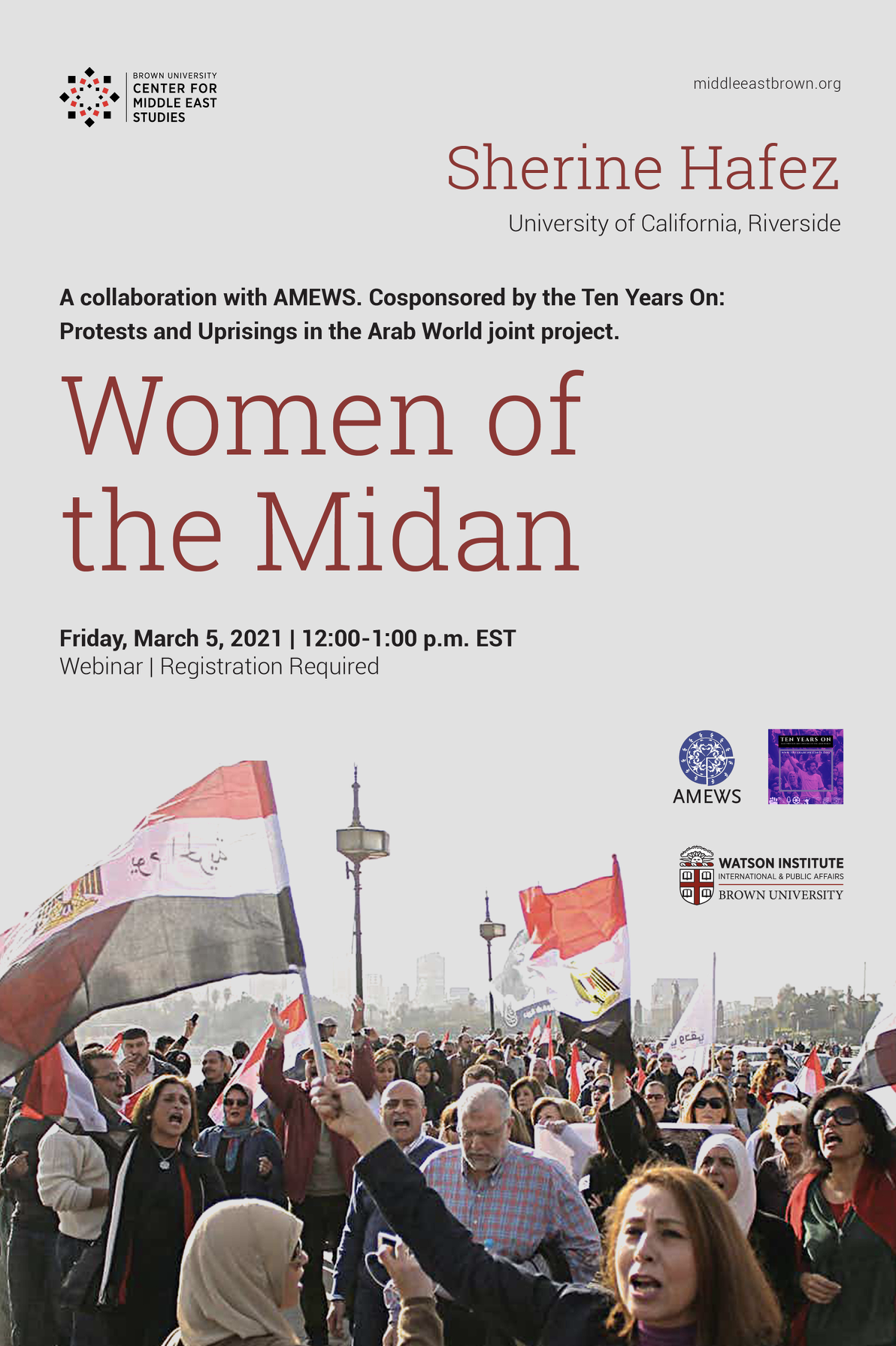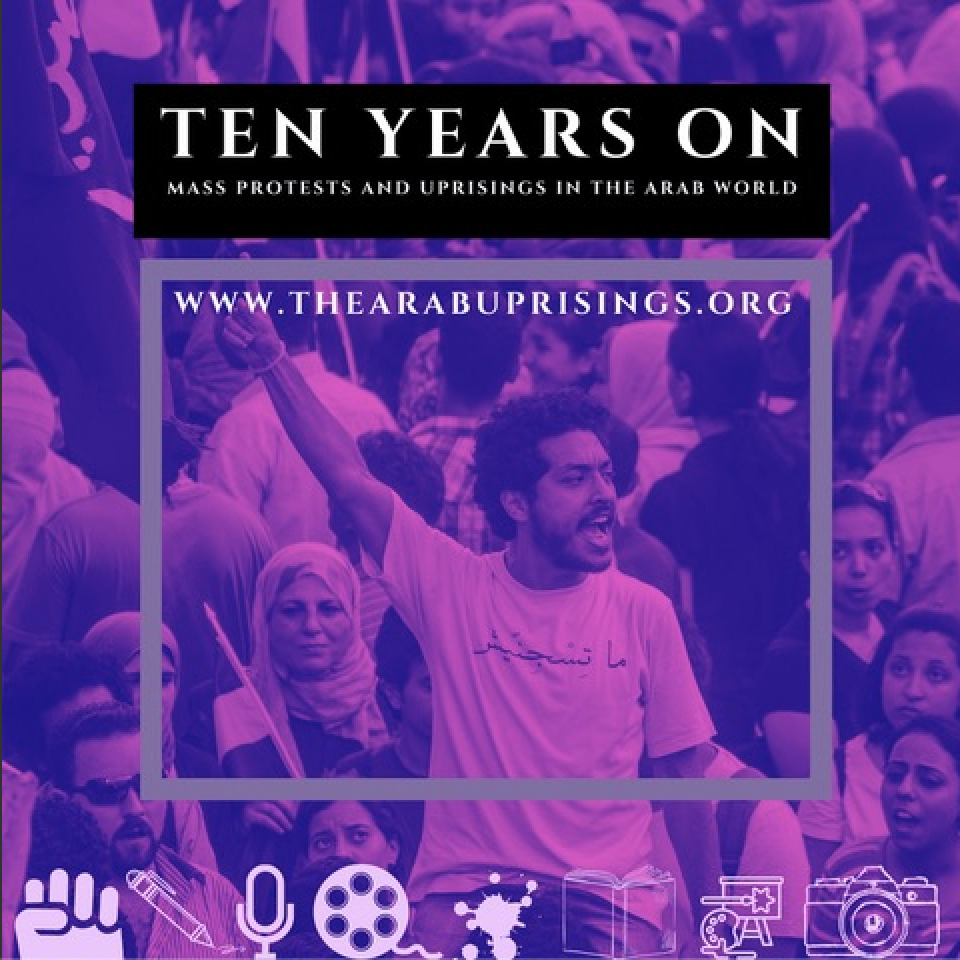Sherine Hafez
Women of the Midan:
The Untold Stories of Egypt's Revolutions
Friday, 5 March 2021
12:00 PM - 1:00 PM EST

This event is hosted by the Brown University Center for Middle East Studies and the Association for Middle East Women's Studies (AMEWS)
It is cosponsored by the “Ten Years on Project”
The ongoing struggles between contentious forces seeking to rewrite the future of millions of Arabs in the Middle East today are the subject of much debate and introspection. While revolutionary Arabs took part in protests that toppled governments and ended tyrannical regimes, their efforts were transmogrified into diverging outcomes that threaten to dismantle the region as we know it. Scholars and observers of Arab societies and politics have produced a vast amount of literature about the revolutions—what are they? Why did they emerge? What did they achieve or not achieve?—and many analyzed the impact on the region’s geopolitical contours, all important contributions that must be considered. The bulk of this literature, however, addresses the events of the “Arab Spring” and its aftermath largely from a default male perspective and with emphasis on masculine-centric issues in the public sphere. Our knowledge of these important historical events has now been shaped by a plethora of documentation that normalizes male-centric views of the revolutions and takes for granted patriarchal forms of politics and social behavior with little or no input from women. Only a handful of scholarly publications have dealt with the events following the uprisings of 2011 from women’s perspectives. Considering that they were integral to the revolutions that took place in the Arab region, disproportionately representing women in the literature that will serve as a record of a major historical event for future specialists leads to a masculine-centric historiography of the Arab uprisings and the region as a whole. Limiting our sociocultural narrative to male-centric historicity ignores the experiences and responses to the political environment where both men and women live, their strategies and negotiations, and the measures they take to exercise their agency.
Bringing Arab women to the center of the historical narrative, this book draws on accounts by Egyptian women who witnessed the realities of the revolutionary period that began on 25 January 2011 and continue to this day. Based on interviews collected over a five-year period with women from various backgrounds, classes and religious background, this current publication aims at redressing the imbalance of a male historical gaze that obscures women. It aims at producing an anthropological analysis of the 2011 revolution in Egypt that recenters women next to men as main actors during the events that toppled former president Mubarak, the elections that brought Muslim Brotherhood candidate Mohamed Morsi to government, and the events that surrounded the beginning of the current military regime of President el-Sisi. It does so without exceptionalizing women as a distinct “category” of analysis over men. Instead, it takes account of the struggles of the Egyptian people as they fought for a dream of “bread, freedom and social justice.” It is with this particular aim in mind that the following work is put to paper. To bring together a narrative that is inclusive of women in a male dominated scholarly epistemology.
Sherine Hafez is Professor and Department Chair of Gender and Sexuality Studies. She is the Co-Editor of the Journal of Middle East Women’s Studies (JMEWS) and served as President for the Association of Middle East Anthropologists (AMEA). Hafez’s research focuses on Islamic movements and gender studies in Arab and Middle Eastern cultures. Her new book, Women of the Midan: The Untold Stories of Egypt’s Revolutionaries (Indiana University Press, 2019), discusses Egypt’s revolutionary women and gendered corporeal resistance in the Middle East. Hafez is the author of The Terms of Empowerment: Islamic Women Activists in Egypt (2003), a book which questioned the applicability of western liberal conceptions of empowerment to Islamic women's activism. Her second book, An Islam of Her Own: Reconsidering Religion And Secularism In Women's Islamic Movements (New York University Press, 2011), challenges binary representations of women's subjectivities in Islamic movements by relating the interplay between the complex debates of modernity and postcoloniality to the particular historicity of Islam and secularism. She co-edited Anthropology of the Middle East and North Africa: Into the New Millennium (Indiana University Press, 2013). Her articles have appeared in American Ethnologist; Signs: Journal of Women in Culture and Society; Feminist Review; and the Journal of Middle East Women’s Studies and Journal of North African Studies. Hafez lectures on gender studies in the Middle East and Muslim majority countries, Islamic movements, women’s Islamic activism, and the uprisings in the Arab World.
Ten Years On
Mass Protests and Uprisings in the Arab World
This event is part of the Ten Years on Project, a year-long series of events, reflections, and conversations created to commemorate the tenth anniversary of the start of the Arab uprisings in Tunisia. We launched this project in order to interrogate and reflect on the uprisings, with the hope of producing resources for educators, researchers, students, and journalists to understand the last decade of political upheaval historically and in the lived present.
Beginning in 2011, mass uprisings swept North Africa and the Middle East, spreading from the shores of Tunisia to Egypt, Libya, Syria, Yemen, Bahrain, and the Eastern Province of the Arabian Peninsula. A “second wave” of mass protests and uprisings manifested during 2019 in Sudan, Algeria, Lebanon, and Iraq. The persistence of demands for popular sovereignty even in the face of re-entrenched authoritarianism, imperial intervention, and civil strife is a critical chapter in regional and global history.
Watch all of our previous Ten Years on events here:

